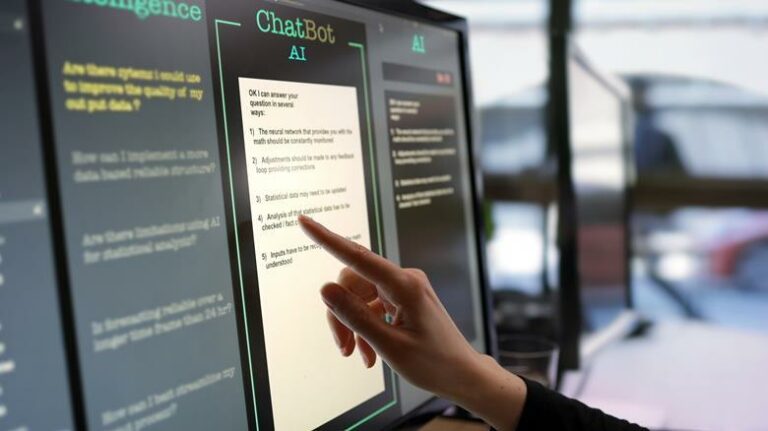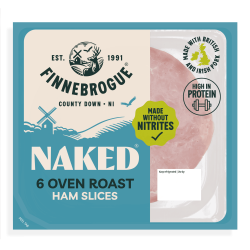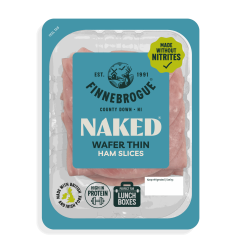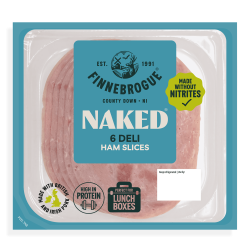Finnebrogue is working with food supply chain solution provider, Foods Connected, Queen’s University Belfast and Bia Analytical to explore AI use cases in a safe and secure environment in a project funded by Innovate UK.
Declan Ferguson, Finnebrogue’s R&D, Technical and Sustainability Director is part of a dynamic team of industry and academia working with Foods Connected Ltd on creating generative AI solutions for improving productivity and efficiency. The new Innovate UK-funded AI project will improve data-driven decision making, by analysing data faster and more precisely than a human can.
The project will work with Finnebrogue, who are known for the innovaiton, to develop a bespoke generative AI chatbot, that will work synonymously with the Foods Connected platform to improve data driven decisions. The project will explore the use of representative data to build and test the chatbot to represent a real-life scenario, whereby users can ask the chatbot questions and receive answers back, ultimately saving time and improving efficiency and decision-making abilities.
• Queen’s University Belfast (QUB) will create a Machine Learning model from a global library of soya samples tested to discriminate origin; a key development in the face of the 2025 European Union Deforestation Regulation (EUDR).
• Using the work completed by QUB, Bia Analytical will subsequently develop a cost-effective rapid test for soya origin discrimination based on the development and utilisation of an ML model. This rapid test can be used in the field or factory by manufacturers such as Finnebrogue to validate the origin of soya procured.
Dr Stephanie Brooks, Head of Research & Innovation at Foods Connected, says:
“Agri-Food has been identified as a high priority sector for the development of Artificial Intelligence (AI) and Machine Learning (ML). Through our project, users will be able to ask the chatbot, ‘What recipes contain soya as an allergen?’ The outputs and responses will then be able to help users determine what products they produce contain soya or any other allergen significantly faster than they can today. Currently this involves manually checking and validating numerous product specifications which is timely exercise.”
Declan Ferguson, Research, Development & Technical Director at Finnebrogue, says:
“We are excited to collaborate on this groundbreaking project, which aligns perfectly with our commitment to innovation and quality. The generative AI chatbot will not only streamline our processes but also enhance our ability to make informed, data-driven decisions more quickly and efficiently. This initiative is a significant step forward in ensuring that we remain at the forefront of technological advancements in the food industry.”
Roger McCracken, Managing Director at Foods Connected, says:
“There are endless opportunities for AI application within agri-food. Our generative AI solutions can analyse large amounts of data significantly faster and more precisely than humans, improving data driven decisions and automate administrative tasks and reducing resource waste. We’re excited about the future of this technology and how it will benefit all of our customers globally on their day-to-day use of the platform.”
Dr Di Wu, Lecturer in Metabolomics and Biomarkers Discovery at Queen’s University Belfast, says:
“Soybean is known as one of the most important grain crops and commodities for economic development, however, it is usually criticised for its close link with deforestation in some key environmentally sensitive areas. Through our project, we will develop novel approaches by integrating state-of-the-art machine learning algorithms with elemental profiling data (via ICP-MS). This will enable the industry partners/end users to tell where the soybeans are sourced from and serve for tracking and tracing purposes of the soybean geographic origin.”
Simon Cole, CEO, at Bia Analytical, says:
“Soya bean production is a leading driver of deforestation, increasing carbon dioxide emissions and contributing to climate change. Our pioneering Biametric™ model authenticates samples at the point of test, making it possible to identify the country of origin of each soya bean sample. This knowledge will enable manufacturers and retailers to make critical informed instant decisions at the time of sampling about the impact of soya bean origins on their sustainability commitments.”
Dr Terry McGrath, CSO, at Bia Analytical says:
“Bia Analytical are very excited to be a part of this project. The development of the rapid and portable country of origin test will give users instant results. This information can be fed into the Foods Connected platform as a data source for the generative AI chatbot therefore will help decision making.”
This initiative is just one of almost 100 ground-breaking projects which have been awarded financial backing as the government continues its mission to boost productivity and kickstart growth across the economy through AI so everyone is better off.
The project is funded through the UKRI Technology Missions Fund to secure the UK’s global leadership in emerging and future AI technologies. The projects are delivered through the Innovate UK BridgeAI programme, whose additional support also includes access to training and scientific expertise, expert AI advice and guidance, and greater collaboration between businesses and developers.






